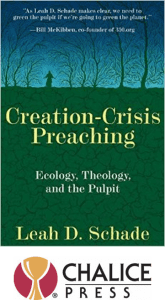I am co-authoring a book tentatively titled, Apocalypse When? A Guide to Interpreting and Preaching Apocalyptic Texts, with my colleague Jerry Sumney. He teaches biblical studies and I teach preaching and worship at Lexington Theological Seminary. Each chapter will include biblical exegesis followed by ideas for preaching and a sample sermon. One chapter will be looking at Matthew 24:36-44, Jesus’s apocalyptic discourse, and what it means for the church in light of the climate crisis. Here is an excerpt from that chapter in which we explore ideas for preaching this text.

Matthew 24:36-44
‘But about that day and hour no one knows, neither the angels of heaven, nor the Son, but only the Father. 37For as the days of Noah were, so will be the coming of the Son of Man. 38For as in those days before the flood they were eating and drinking, marrying and giving in marriage, until the day Noah entered the ark, 39and they knew nothing until the flood came and swept them all away, so too will be the coming of the Son of Man.
40Then two will be in the field; one will be taken and one will be left. 41Two women will be grinding meal together; one will be taken and one will be left. 42Keep awake therefore, for you do not know on what day your Lord is coming. 43But understand this: if the owner of the house had known in what part of the night the thief was coming, he would have stayed awake and would not have let his house be broken into. 44Therefore you also must be ready, for the Son of Man is coming at an unexpected hour.
The End is Near
In his exegesis, Jerry notes that “while Matthew probably thinks the end is near, it is clear that speculation about its timing is useless. What is really important is the certainty of its coming.” For Matthew, referencing the well-known story of Noah’s building of the ark underscores this point. While the crowds mocked Noah’s efforts, and while he could not give them an exact timetable for the coming of the flood, the fact that it was coming was still certain. The point Matthew has Jesus emphasize in this passage is that being prepared for that which we cannot predict is the key for the church. The same is as true for the church today as it was in Matthew’s time.
The Uninhabitable Earth
Today’s Christians may find Noah’s story, as well as Jesus’s warnings, to be similar to warnings we hear about what our world is facing with climate change. Certainly, there are important differences between the coming of the Son of Man and the growing climate crisis. However, the call for being prepared is applicable in both cases.
While climate scientists cannot predict exactly what will happen or when, the apocalyptic scenarios are of frighteningly biblical proportions. David Wallis-Wells’ book, The Uninhabitable Earth: Life After Warming, lays out in explicit terms what human society will face when it comes to damage to our planet, including crop failures, increases in heat deaths, wars over resources, a surge of climate refugees, exotic diseases, unbreathable air, oceans unable to sustain life, and economic collapse.
Those in the pews may hear biblical calls for preparedness now echoed by those urging preparations for the consequences of global warming and climate change. While proponents of Rapture-theology hope for a magical whisking away of the faithful before the onslaught beings, as Sumney notes, “the people of God are not removed from tribulations but are rather called to endure them faithfully.”
The question for Christians, then, is: what is the role of the church in the face of the climate crisis?
How can we help prepare congregations and communities as part of our mission to the world? A sermon on Matthew 24:36-44 can explore the image of the church as a kind of ark offering refuge and safety in the midst of cataclysmic climate change.
The Church as the Ark
Christian writers from Cyprian to Augustine to Luther to Calvin compared the church to Noah’s ark, noting that the church should be a place of refuge, safety, and salvation. Frederick Buechner, too, picked up on the metaphor of the church as Noah’s ark, which he describes in his book, Beyond Words: Daily Readings in the ABC’s of Faith:
In one as in the other, just about everything imaginable is aboard, the clean and the unclean both. They are all piled in together helter-skelter, the predators and the prey, the wild and the tame, the sleek and beautiful ones and the ones that are ugly as sin. There are sly young foxes and impossible old cows. There are the catty and the piggish and the peacock-proud. There are hawks and there are doves. Some are wise as owls, some silly as geese; some meek as lambs and others fire-breathing dragons.
There are times when they all cackle and grunt and roar and sing together, and there are times when you could hear a pin drop. Most of them have no clear idea just where they’re supposed to be heading or how they’re supposed to get there or what they’ll find if and when they finally do, but they figure the people in charge must know and in the meanwhile sit back on their haunches and try to enjoy the ride.[ii]
Buechner points out that the ark is, in fact, no joyride.
“But even at its worst, there’s at least one thing that makes it bearable within, and that is the storm without — the wild winds and terrible waves and in all the watery waste no help in sight.”
What keeps the ship afloat and the inhabitants from killing each other is a certain trust that even in the midst of the watery blasts, there will be peace at the last and safe harbor in which to rest. Reminding a congregation that the shelter afforded by the church in the midst of the waves and wind is no small thing. That they can cling to each other and their faith in God is what can help sustain them during the trying times.
By extension, the “ark” of Christianity can, and must, in good faith join scientists and community activists in helping communities prepare for the inevitable effects of climate and environmental collapse.
[See also my chapter, “Building the Eco-Ethical Ark in the Age of Climate Disruption” in the book Rooted and Rising: Voices of Courage in a Time of Climate Crisis.]
In addition to a clean energy transition, scientists have called for “rapid decarbonization, plus a revolution in food production, plus a sustainability revolution, plus a massive engineering scale-up [for carbon removal],” according to Johan Rockström, lead author of “A roadmap for rapid decarbonization,” a 2017 paper in the journal Science. A pastor preaching on this text may want to have materials available for parishioners to learn more about how houses of worship can reduce energy use, build resilience in communities for dealing with the effects of climate change.

The faith-and-climate organization Blessed Tomorrow, for example, has well-researched resources on how congregations can become places of safety and resettlement for climate refugees, and encourage support for policies at the local, state, and federal level that protect Creation. (See their guide “Let’s Talk Faith & Climate: Communication Guidance for Faith Leaders” for developing successful messages and utilizing strong talking points on climate change as a faith issue.)
[For more ideas on preaching about climate and environmental issues, see my book Creation-Crisis Preaching: Ecology, Theology, and the Pulpit.]
The preacher can emphasize the good news that, thankfully, more and more followers of Jesus and other faith communities are making Creation-care a priority.
An increasing number of religious groups are working to create healthy and safe communities for our families as they come to view ecological issues as a matter of living out the Golden Rule. Nine different denominations have moved to divest from fossil fuels, including the ELCA, the United Church of Christ, and the Disciples of Christ (Christian Church). There are also ecumenical and interfaith organizations that are advocating for protecting God’s Creation, such as Interfaith Power & Light, ecoAmerica’s Blessed Tomorrow, Greenfaith, and the Poor People’s Campaign.
Of course, just as there were naysayers and deniers among Noah’s neighbors, Jesus’ listeners, and Matthew’s readers, so there will be such individuals in congregations who refuse to accept the realities of the climate crisis.
This does not mean, however, that a pastor should give up or avoid preaching about the need to prepare for the worsening climate crisis.
In fact, research from a 2014 survey conducted by the Public Religion Research Institute (PRRI) and the Academy of Religion (AAR) indicated that parishioners who attend churches where the pastor speaks publicly about climate change are more likely to take the issue seriously than those who attend churches where pastors say nothing on the topic. In other words, the sermon can make a difference in helping cultivate a spirit of preparedness in the congregation.
[To see an example of how climate change can be integrated into a sermon-dialogue-sermon series, check out chapter 10 of my book Preaching in the Purple Zone: Ministry in the Red-Blue Divide.]

Leah D. Schade is the Assistant Professor of Preaching and Worship at Lexington Theological Seminary in Kentucky. She is the author of Preaching in the Purple Zone: Ministry in the Red-Blue Divide (Rowman & Littlefield, 2019), Rooted and Rising: Voices of Courage in a Time of Climate Crisis (Rowman & Littlefield, 2019), and Creation-Crisis Preaching: Ecology, Theology, and the Pulpit (Chalice Press, 2015).
Twitter: @LeahSchade
Facebook: https://www.facebook.com/LeahDSchade/
Read also:
Noah’s Ark and Climate Change: What Kind of Church Will We Be?
Preaching as Resistance: Encountering Pharaoh—and Climate Change
See also: “Scientists made a detailed “roadmap” for meeting the Paris climate goals. It’s eye-opening.” Brad Plumer, Vox.com, March 24, 2017 https://www.vox.com/energy-and-environment/2017/3/23/15028480/roadmap-paris-climate-goals













